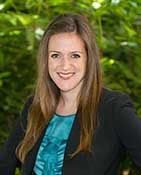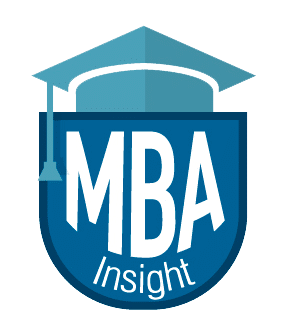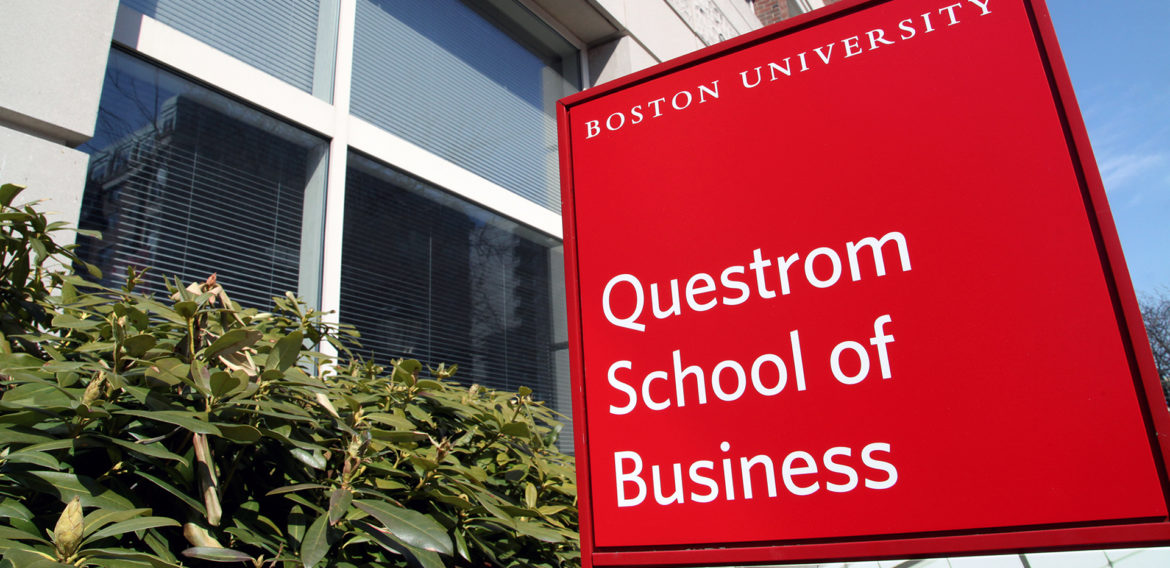Boston University Questrom School of Business
Dana L. MacFaun, Director of MBA Admissions What is the one area of your program that you wish applicants knew more about? Boston University is one of the largest private research institutions in the country. We have over 33,000 undergraduate and graduate students from more than 130 countries, nearly 10,000 faculty and staff, 250 fields of study, and 17 schools and colleges. With this comes great advantages and a tremendous number of resources. Our students have the unique opportunity to collaborate with students outside of the business school. They can take classes at the other graduate schools on campus, or take it a step further by pursuing one of our numerous dual degree programs. They have hundreds of ways to customize their degree, allowing them to tailor their degree to their specific interests and goals. In addition, we host several campus-wide institutes and research centers that promote collaboration across the University, and drive innovation through research, forums, and ongoing relationships with businesses across the globe. Many are administered through Questrom, such as the Susilo Institute for Ethics in the Global Economy, which provides business students and leaders with the tools to make the most responsible decisions for their organizations and society. We also work closely with our startup incubator, the BUzz Lab, which is BU’s hub for entrepreneurship and home to some of the most creative ideas on campus. Then there’s the Boston University Institute for Sustainable Energy, which is working toward a greener future for our world. It’s also helping Questrom and BU become leaders in the global sustainability community. But what many people don’t realize is that our MBA programs are actually quite small, allowing our MBA students to experience the “best of both worlds.” They get to be part of a tight-knit, collaborative community, offering the opportunity to develop strong relationships with their classmates. They get personalized attention from faculty and professors, and can meet with their advisors one-on-one to craft their personalized career strategy. They get the feeling of being in a small program, all without having to sacrifice the benefits of being at a larger school. What’s the single most exciting development, change, or event happening at you MBA program this coming year? In 2014, Boston University Questrom School of Business hosted the Business Education Jam (www.bu.edu/jam) – a massive, free-flowing convergence of ideas, concepts, and collaborations that started a path toward a more powerful model for business education. Over 60 consecutive hours, nearly 6,000 registrants from around the world—researchers, scholars, students, thought leaders, and executives—united in a unique virtual environment. This year, Boston University Questrom School of Business will take this hallmark event to the next level, driving a series of regional conversations across the globe on the future of business education. In November 2017, the first event, in collaboration with the Gordon Institute of Business Science (GIBS), will be held in Johannesburg, South Africa and bring together leading educators and members of industry to identify pressing regional issues business schools face in Africa. Over the next 24 months, events will continue in Europe, South America, Asia, and North America bringing an unprecedented new global perspective to the regional issues business schools face, and chart new ways for business education to meet the future needs of students and employers. Walk us through the life of an application in your office from an operational standpoint. What happens between the time an applicant clicks “submit” and the time the committee offers a final decision (e.g. how many “reads” does it get, how long is each “read,” who reads it, does the committee convene to discuss it as a group, etc.) Once a candidate submits an application, our team begins reviewing it to ensure we have all required materials. While the application is being processed, the admissions committee simultaneously reviews the application for interview consideration, and if we have enough information to determine whether an interview is appropriate, we send an invitation. Once the application has been processed and we have determined that we have all required materials, the application is assigned to a member of our team for a more thorough review. If not already invited to interview, it is possible for an interview invitation to be sent after this thorough review is completed. We offer three rounds of admissions for our full-time MBA programs, and publish these deadlines, along with specific decision release dates for each round, on our website. In the weeks preceding our decision release dates, our team meets to discuss all candidates who have submitted complete applications during the round of consideration. We then release decisions by our published release date. How does your team approach the essay portion of the application specifically? What are you looking for as you read the essays? Are there common mistakes that applicants should try to avoid? One key thing they should keep in mind as they sit down to write them? The essay is a great way to get to know our candidates on a more personal level. Because everyone expresses themselves in different ways, Boston University offers it’s MBA candidates the unique option of completing either one written essay OR three short-answer video essays – the choice is theirs. From the essay portion of the application, we are trying to get to know more about our candidates than what can be found in other areas of their application. Our essays often give us a better sense of our candidates’ reasons for pursuing an MBA, why they’ve chosen to apply to Boston University Questrom School of Business specifically, how they see the Questrom MBA fitting in with their career goals, and how they’ll fit within and contribute to our community. When writing or recording their essay(s), candidates shouldn’t be afraid to show their personality. One common mistake candidates make is to write or say what they think we want to hear. We are trying to learn more about them, so it’s important they be authentic. In other words, be yourself! Do you have any application tips (for essays & recommendations) for MBA applicants? With regard to the essay portion of the application, candidates should be sure to answer the question(s) being asked, and should make sure their essay(s) are specific to each school to which they are applying. Also, candidates should take advantage of the “optional” essay if they have additional information to share with the admissions committee, such as addressing potential issues or gaps in their application. As for recommendations, it’s important that candidates choose recommenders that know them well, and that they are in the best position to speak to their candidacy for the program to which they are applying. They should be able to speak to their leadership and teamwork skills, to provide examples of projects they’ve worked on, and to discuss both their strengths and areas of improvement. While many schools will want to see recommendations from those who know the candidate in a professional capacity, it’s important for candidates to be aware of the school’s preferences with regards to who the recommenders should be. To learn more about the application process, and to hear tips for submitting a competitive application, applicants can watch our applications tips videos here: http://www.bu.edu/questrom/admissions/graduate-programs/full-time-mba/application-tips/ What are the most important aspects of the MBA application process besides GMAT score, prior GPA and current job position? There is no one factor that “weighs” more than another – each component of the application helps us to determine if a candidate is a good fit for us, and if we are good fit for the candidate. We are trying to assess a myriad of attributes, including, but not limited to, academic ability, ability to contribute on teams and in our community, and the way in which each candidate will contribute to the learning of all students in the program. Each aspect of the MBA application give us insight into these different attributes. What is important is that candidates use the application to tell their story – to connect the dots between their past/current experiences and their post-MBA goals, and how an MBA from our school will help them to reach these goals. How can a candidate overcome a lower GMAT score? One of the attributes we are trying to assess when reviewing an application is academic ability. This is an important factor, and unfortunately there are only a few aspects of the application that can help us to predict academic success in our program – the two most important ones being standardized test scores and academic transcripts. If a candidate has a lower GMAT score, it is important for them to find other ways to provide evidence of academic ability and quantitative aptitude. Because of this, it may be possible to offset a lower GMAT score with strong undergraduate performance, or strong performance on coursework taken after college graduation. The other option is to retake the GMAT, or to consider other tests accepted by the school, such as the GRE. What resources are available at your MBA program to assist with internship and full-time job opportunities? At Boston University Questrom School of Business, the career management process begins with a dedicated career coach in the Graduate Academic and Career Development Center. Our coaches will partner with our students to prepare them for a graduate-level, candidate-driven internship or job search. This search focuses on aligning students’ expertise, academic experience, and future goals with the skills their target employers seek. Our experienced team has years of experience to guide students as they develop the strategic mindset and tactics they’ll need—from developing a network to identifying the best internship and negotiating total compensation for a postgraduate full-time position. When they are ready, coaches will refer students to industry specialists in BU’s Feld Center to get their job search strategy executed. Our students have access to 50,000 Questrom alumni and 300,000 Boston University alumni worldwide. We’re proud that our prominent alumni take an active role in the School and participate in informational interviews and networking events. They return to campus regularly for speaking engagements and classroom visits, and to judge our case competitions. Through the QuestromConnect tool, students are able to connect with alumni in various industries to obtain career advice, mentoring, and informational interviews to learn about their chosen job function and career path. The Feld Center also partners extensively with the MBA student clubs through funding support, alumni and employer engagement, and event logistics support to enable the partnerships and career path exploration goals. Students who graduate from our programs and become proud BU alumni have access to all these services as a lifetime policy to continue helping our alumni to grow their professional careers. 
Boston University, Questrom School of Business


